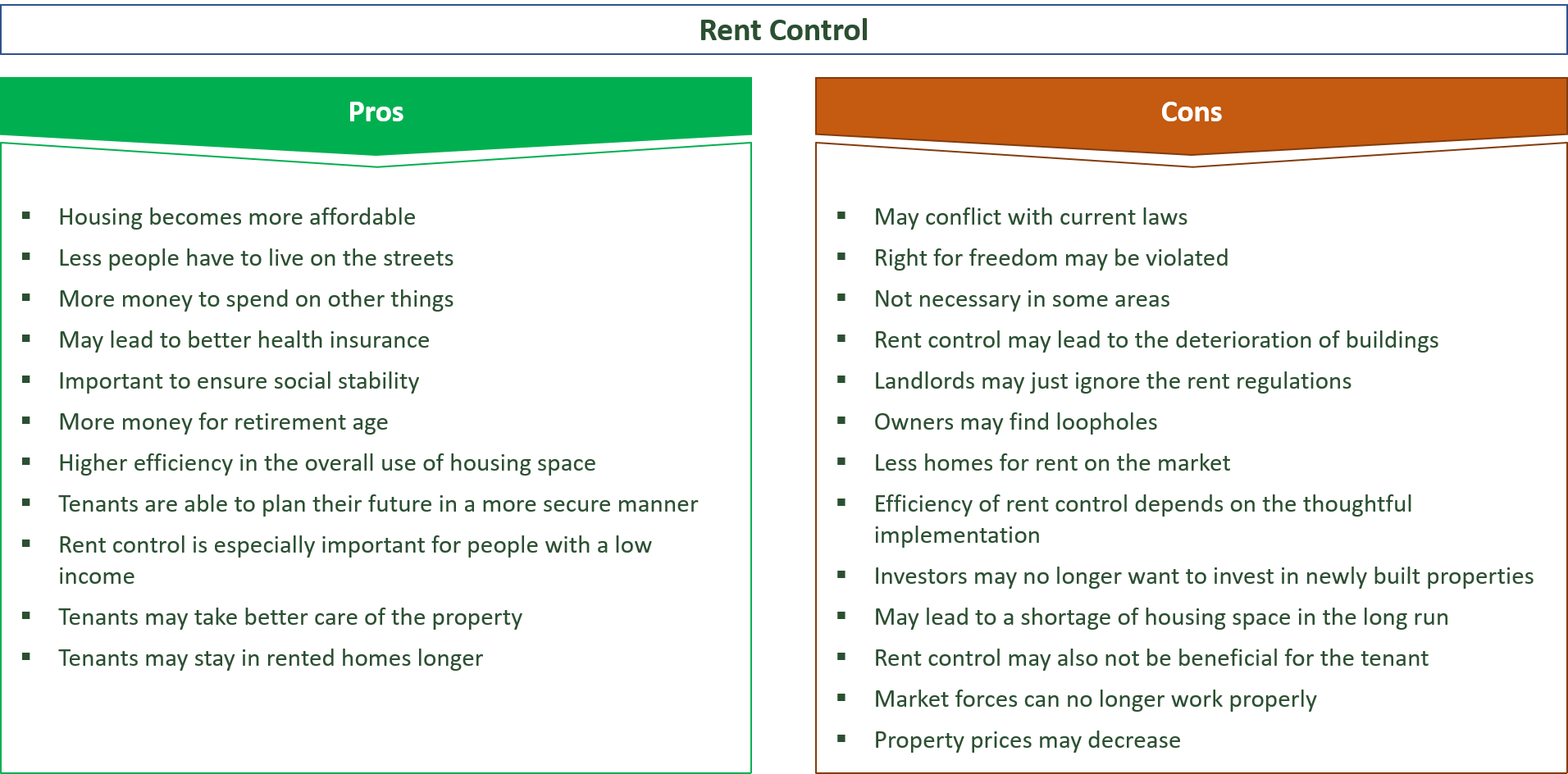“Rent control created deadweight loss.”
Paul Samuelson, Economist
Advantages & Disadvantages of Rent Control

Rent control (often also referred to as rent regulation) is a measure that aims to limit the rents in a specific area to a certain maximum amount.
Rent control is meant to keep housing affordable.
Apart from the many advantages of rent regulation, there are also some problems with this concept.
In this article, the pros and cons of rent regulation are examined.
Audio Lesson
Contents
Advantages of Rent Control
- Housing becomes more affordable
- Fewer people have to live on the streets
- More money to spend on other things
- May lead to better health insurance
- Important to ensure social stability
- More money for retirement age
- Higher efficiency in the overall use of housing space
- Tenants are able to plan their future in a more secure manner
- Rent control is especially important for people with a low income
- Tenants may take better care of the property
- Tenants may stay in rented homes longer
Housing becomes more affordable
One important advantage of rent control is that it can provide us with more affordable housing opportunities.
In many big cities, rents are so high that people who work in regular jobs are only able to afford shared housing or even have to live in a campervan.
This should not be a long-term solution and everyone who works hard in his or her daily life should have the opportunity to rent an apartment without having to spend the majority of his or her wage on it each month.
Hence, in order to make housing more affordable, rent regulations may be an effective measure since through rent control, there is a maximum rent a property owner can charge from tenants and therefore, people would be able to rent a flat or a house at a much lower price compared to a state without rent control.
Fewer people have to live on the streets
Even people who work full-time are often no longer able to afford their rent in expensive cities all over the world.
While some of them have the opportunity to live at their parent’s homes, others might end up homeless in the streets in case rents become too high and they are no longer able to pay their rent.
Nobody should be forced to become homeless just for the reason of rent prices and therefore, capping the rent at a maximum may greatly decrease the financial pressure on tenants, especially on those who only have low to medium salaries.
More money to spend on other things
If people have to spend less money on rent due to rent control regulations, people would have much more money to spend on other things.
This can include many amenities for daily life, but may also include investments in education.
We all know that education is a key driver for success in life and parents with low or medium incomes are often not able to provide their kids with proper education since they have a far too high fraction of their income on monthly rent payments.
For those people, rent control would be quite beneficial since they could spend more money on their kids’ education, which would in turn translate into better job opportunities for those kids and would also increase the chances for more success in their lives in general.
May lead to better health insurance
Another benefit of rent control measures is that it might also give people the opportunity to get better health insurance.
In many countries all over the world, it is still quite common that people don’t have any health insurance at all.
In case people get sick, they have to spend large amounts of money on their treatment and many people will not be able to afford this.
In turn, many people may not get proper medical treatment and may suffer from serious long-term health issues.
Hence, it is crucial that everyone gets health insurance.
People often do not have proper health insurance since they can’t afford to pay the monthly fees for it.
Yet, with proper rent control, people would have more money left on average each month and could use this money to get good health insurance.
Therefore, rent control may indirectly also give more people the opportunity to get health insurance and to be covered in case they suffer from serious health issues and urgently need expensive treatment.
Important to ensure social stability
If rents become too high, this can also lead to serious problems for our social stability.
People may accept increases in rent up to a certain point.
However, if they only have to work to be able to pay their rent and cannot afford any amenities anymore, chances are that people will become quite frustrated, which may turn into serious conflicts and social tensions in the long run.
Hence, in order to ensure social stability and to avoid conflicts amongst citizens, rent control can be a good measure to limit rents and to stabilize the cohesion in our society.
More money for retirement age
Many retirees all over the world complain that they do not have enough money to buy basic things for their daily life and to pay their rent each month.
This is especially true for people who worked in low-wage jobs since they often weren’t able to afford sufficient amounts of money for their social security.
In turn, once they get retired, those people will barely able to ensure their livelihood.
This is especially true since pensions are rather fixed and will not increase too much while rents may increase much faster.
In the worst case, those old people may end up homeless, even though they worked their whole life.
This can not be justified and people who worked hard for their whole life should have the security that they don’t lose their home due to increasing rent payments.
Thus, rent control can also make sense to protect pensioners from excessive increases in rents over time.
Higher efficiency in the overall use of housing space
In many big cities, the space for housing is quite limited.
Most of the areas have already been used to built houses on it and there is just pretty confined space left for building additional houses or flats.
Making things worse, even though the demand for housing may be quite high, some property owners may not even rent their flats to tenants since they may want to sell their property and properties without tenants in it may lead to higher prices on the market.
Hence, in order to mitigate this problem and to increase the efficiency of the overall use of housing space, regulators should consider rent control in conjuncture with a rule that makes it mandatory for property owners to rent their property or to live in it.
With those measures, rents could be capped and housing space could be used more efficiently, which is urgently needed in many big cities since the demand for affordable housing is usually quite high.
Tenants are able to plan their future in a more secure manner
Tenants in big cities often also suffer from significant insecurities regarding how their future will look like since they often do not know whether the landlord will raise the rent in the near future.
Therefore, it will also be difficult for many tenants to decide whether they are financially able to have kids or not.
In order to take away many of those insecurities, rent control may be a good measure to do so since it would give tenants a higher level of protection against excessive increases in rents.
In turn, due to this increase in security, chances are that also the overall quality of life for many tenants would increase as well.
Rent control is especially important for people with a low income
Especially people who only earn quite low incomes will have a quite hard time in case they have to pay significantly higher rents over time.
The problem is that the wages in many low-wage jobs will not increase too much while at the same time, chances are that rents in big cities will increase much faster.
In turn, this means that people in those jobs will have to spend more and more money on their rent each month while their income will not increase too much at the same time.
This may lead to a state where people will have to spend the majority of their income just to cover their rent and there might not be sufficient money left to buy basic things for their daily life.
Therefore, rent control might be especially valuable for people with a low income since those people would no longer be able to pay their rent sooner or later.
Tenants may take better care of the property
Another upside of rent control is that tenants may also take much better care of the respective property.
For instance, without rent control, people may not care too much about the property at all since rents will be quite high and people may not fear losing their flat too much since they already pay a quite high price.
However, through the introduction of rent control, people would likely care about the property much more since they would have a greater fear to lose their affordable housing opportunities.
Thus, rent control may even benefit the landlord of a property in case tenants care about the property more since also the value of the property would likely increase in this case.
Tenants may stay in rented homes longer
If the average rent becomes lower due to rent control, chances are that tenants will also stay in their flats or houses longer since in case they move out, they would lose their affordable housing opportunity and therefore would have a greater incentive to stay in the respective property for an extensive period of time.
In turn, this would also benefit the landlord since he or she would have to search for new tenants less often.

Disadvantages of Rent Regulation
- May conflict with current laws
- Right for freedom may be violated
- Not necessary in some areas
- Rent control may lead to the deterioration of buildings
- Landlords may just ignore the rent regulations
- Owners may find loopholes
- Fewer homes for rent on the market
- Efficiency of rent control depends on the thoughtful implementation
- Investors may no longer want to invest in newly built properties
- May lead to a shortage of housing space in the long run
- Rent control may also not be beneficial for the tenant
- Market forces can no longer work properly
- Property prices may decrease
- May also benefit people who could afford to pay higher rents
- Lower tax revenue for the local municipality
- Significant administration costs related to rent regulations
- Makes it harder to sell your home
- Rent control may imply financial problems for property owners
May conflict with current laws
Apart from the many advantages of rent control, there are also some issues related to it.
One problem of rent control is that it may conflict with local laws.
In many countries all over the world, rent control schemes may not be in line with the local constitutions and may therefore not be feasible to implement.
Chances are that landlords may not accept those kinds of rent regulations and may stop those regulations in court.
Right for freedom may be violated
Opponents of rent control also often claim that rent regulations would not be in line with the concept of individual freedom.
Everyone should be able to decide what to do with his or her property and should not be forced into rent caps or other things that could prevent this overall freedom.
Hence, rent control may also be questionable from an individual rights standpoint.
Not necessary in some areas
While housing opportunities are quite rare in many big cities all over the world, there are still many areas around the globe where there is plenty of affordable housing.
This is especially true in rural areas and in those regions, it would not make sense to implement rent control schemes at all.
Hence, rent control only makes sense in regions where housing opportunities are scarce and regulators should take great care to only implement those rent control schemes in regions where they are urgently needed.
Rent control may lead to the deterioration of buildings
Another big disadvantage of rent control is that this regulatory measure can also lead to a significant deterioration of buildings over time.
In fact, if the rent is capped to a certain amount, property owners will have no incentive to invest money in renovations since the return of those measures is often too low to justify the significant renovation costs.
In turn, many buildings may deteriorate over time and in the long run, there might even be less affordable housing left.
Hence, rent control may not create, but even reduce affordable housing opportunities in the long run in case landlords are no longer willing to invest money for maintenance and renovations into their properties.
Landlords may just ignore the rent regulations
Depending on the fines that are associated with violations of rent control regulations, many landlords may also just ignore those regulations.
In case they do not have to fear high fines, landlords may just continue to increase rents and rent control measures might be quite inefficient.
Therefore, in order to be efficient, regulators have to make sure that rent control regulations also involve significant fines in case landlords violate the rules so that landlords have a real incentive to obey those rent regulations.
Owners may find loopholes
Another downside of rent control is that it often provides landlords with a significant number of loopholes that can be exploited.
For instance, landlords may rent a furnished flat and might be able to charge a much higher rent compared to renting the same flat in an unfurnished condition.
Hence, regulators have to make sure to close those loopholes in order not to do more harm than good with those rent regulations.
Fewer homes for rent on the market
In the long run, rent control regulations may also lead to a state where most of the property will be used by property owners and far fewer properties will be rented out to tenants since property prices will be too high to be attractive for investors compared to the rent they can achieve.
In turn, people who want to rent a flat or a house will have a quite hard time finding such an opportunity since there will simply not be sufficient properties for rent.
Therefore, while rent control may be beneficial for tenants in the short run, it might have detrimental effects in the long run.
Efficiency of rent control depends on the thoughtful implementation
While rent control might be an effective measure to lower the average rent in the respective city or region, it might also do more harm than good if this regulatory scheme is not implemented in a proper manner.
Hence, it is crucial that politicians know what they are doing before implementing those rent regulations in order to avoid significant negative outcomes for the housing market in the long run.
Investors may no longer want to invest in newly built properties
Another problem of rent control is that it might deter investors from investing in newly built properties.
If it will no longer be profitable to build houses in big cities due to rent regulations, chances are that big real estate companies will no longer invest in those regions and therefore, there might actually be less affordable housing space in the long run due to the introduction of rent regulation schemes.
May lead to a shortage of housing space in the long run
In general, if rents are capped at a rather low price compared to the property prices in the respective region, chances are that there will be a significant shortage of housing space over time.
On the one hand, investors will no longer be willing to invest in new construction projects.
On the other hand, private persons will no longer buy properties for investment purposes, but rather to occupy them instead. Both effects will likely lead to a state where there will be a serious lack of affordable renting opportunities.
Rent control may also not be beneficial for the tenant
Since landlords will no longer invest in properties to maintain and renovate them, chances are that the concept of rent control may even do more harm than good for tenants.
For instance, tenants may have to live in deteriorated buildings in the long run since it may just not make sense for property owners to invest any money into renovations due to strict rent regulations.
Market forces can no longer work properly
Rent control may also lead to a state where free market forces may no longer work properly.
There are many economic theories which state that a free market will result in the most efficient outcomes for everyone in the long run and that every intervention that prevents free market forces to work in an efficient manner may lower the total welfare of an economy.
Hence, in order to maximize overall welfare, we may not want to introduce rent control measures.
Property prices may decrease
Another issue related to rent control is that property prices of homeowners may significantly decrease over time.
Some people might have bought their houses at a quite high price and due to the implementation of rent caps, property prices may drop.
However, this may not be fair for those homeowners who bought their houses at quite high prices.
May also benefit people who could afford to pay higher rents
Since rent control would benefit everyone in society, also people who would actually be able to afford to pay high rents would now be able to pay lower rents.
However, there might not be reasons why wealthy people should not pay appropriate rents if they are easily able to afford it.
Hence, rent control may also not be fair in this regard.
Lower tax revenue for the local municipality
If property prices drop due to the implementation of rent control, also the tax revenue from property taxes will decrease and local municipalities may have lower tax income to fund important infrastructure projects.
Significant administration costs related to rent regulations
In order to monitor and supervise rent control schemes, plenty of controls and bureaucratic work are necessary.
In turn, this can lead to significant administration costs, which may result in a serious waste of taxpayers’ money in the long run.
Makes it harder to sell your home
In regions where strict rent regulations have been introduced, chances are that property owners may also have a quite hard time to sell their home at a reasonable price since buyers will take those rent caps into account for their buying decision.
Rent control may imply financial problems for property owners
Some property owners who invested in houses or flats may also have to pay back a loan to their local bank.
However, in case those loan payments are quite high and property owners do no longer get sufficient rent payments due to rent control regulations, chances are that some of them will get into financial trouble and may even be forced to sell their property.

Top 10 Rent Control Pros & Cons – Summary List
| Rent Control Pros | Rent Control Cons |
|---|---|
| Housing may become more affordable | May lead to the deterioration of buildings |
| Rent control may protect poor people | Rent control may not be in line with other laws |
| May protect pensioners from poverty | Property owners may find loopholes |
| More disposable income for other things | Fewer rent properties will be available |
| Lower risk for homelessness | Lower overall real estate investments |
| Rent regulations may make living more efficient | Decrease in property prices |
| Tenants have more security | Rent regulations may not be necessary |
| Tenants may take better care of a property | Lower property tax revenue |
| People may stay in properties for longer | Hard time to sell your home |
| Rent control may help to ensure social stability | Financial problems for landlords |
Do We Need Rent Control?
We can see from the previous discussion that there are plenty of advantages and disadvantages of rent control.
The implementation of rent regulations can make sense under certain conditions and in specific regions.
However, regulators should make sure not to make those regulations too strict since they can do more harm than good in the long run.
Sources
https://en.wikipedia.org/wiki/Rent_regulation
https://www.investopedia.com/terms/r/rent-control.asp

About the author
My name is Andreas and my mission is to educate people of all ages about our environmental problems and how everyone can make a contribution to mitigate these issues.
As I went to university and got my Master’s degree in Economics, I did plenty of research in the field of Development Economics.
After finishing university, I traveled around the world. From this time on, I wanted to make a contribution to ensure a livable future for the next generations in every part of our beautiful planet.
Wanna make a contribution to save our environment? Share it!
